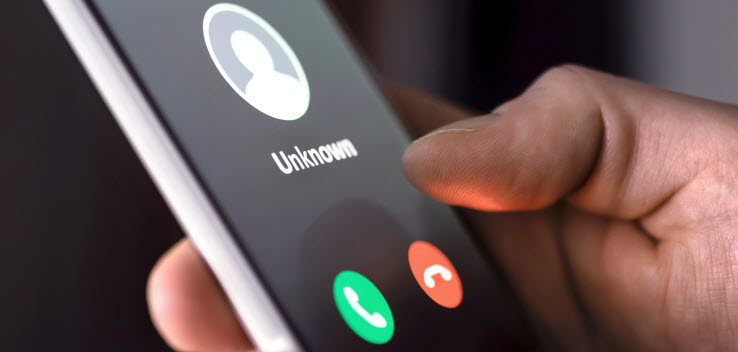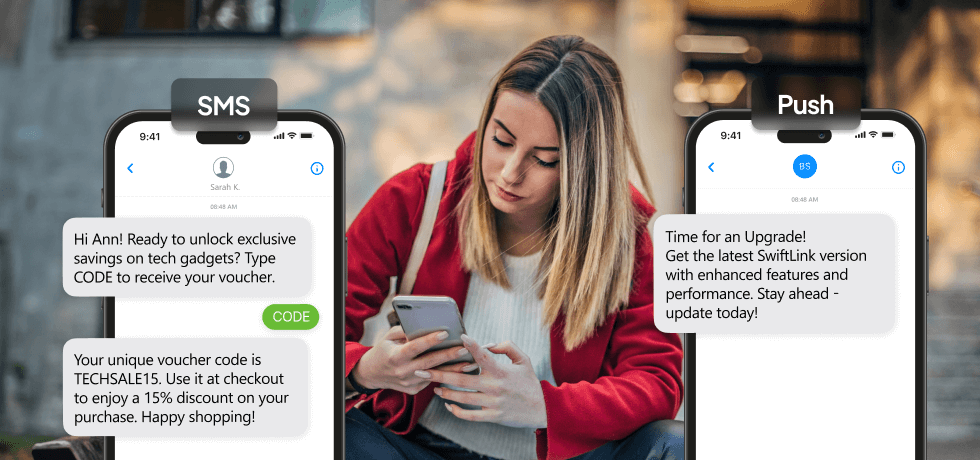
Scammers get your phone number and use highly sophisticated methods to con you of money and sensitive information.
The number of scam calls has been steadily rising across the world.
For instance, the number of scam calls targeting Americans rose by 118% in 2021 compared to 2020.
Similarly, a recent survey revealed that 4 out of 10 adults in the UK received a suspicious call during the year 2021.
The same survey shows that 2% of these targets fell into the scammers’ traps and followed their instructions.
Along with scam calls, scammers get your phone number for other purposes, such as taking over your bank account and committing identity fraud.
This article will tell you how these fraudsters get your phone number and how you can protect yourself.
How do scammers get your cellphone number?
From filling out online forms to logging in to your bank account, you use your phone number to confirm your identity.
Just like your email address, your phone number is among the most common form of personal information you use in everyday life.
Scammers get your phone number exactly for this reason, and they illegally get your number via the following methods.
Dark web
Fraudsters buy phone numbers in bulk on the dark web. For example, the phone numbers of four million Clubhouse users were up for sale as a dataset on the dark web.
Buying millions of phone numbers on the dark web does not cost scammers much.
For instance, the price for basic personal details of an American, including his phone number, is just $8.
Number generator
Another common method scammers use is the auto-dialer. This equipment generates and calls random phone numbers.
Social media, web searches, and directories on the web
Phone numbers are spread across many social media platforms, websites, and phone directories around the Internet. Fraudsters use various techniques, such as web-scraping, to glean phone numbers from the web.
What can scammers do with your phone number?
Scammers illegally get and use phone numbers for a variety of malicious purposes:
Scam calls
This is the most prevalent reason scammers are after your phone number. Scammers get your phone number and then make scam calls to con you of money, financial, and other sensitive information.
Scammers commonly impersonate well-known banks, insurance providers, government institutions, or mega-retailers to trick you.
For example, HMRC revealed that people in the UK received approximately 600,000 calls from scammers impersonating HMRC in 2021. In some of these calls, scammers asked for sensitive financial information and also convinced individuals to make payments by offering them tax rebates and by threatening them with imminent penalties because of unpaid taxes.
Scammers can use your phone number to steal your accounts
You often use your phone number to log into apps such as banking apps on your mobile phone, and a text to your number can be a multifactor authentication method.
However, some of these SMS systems are not end-to-end encrypted and can be easily hacked. If the scammers get your phone number, they can redirect this text message to their number and gain access to your apps and/or bank accounts.
Take over social media account
Fraudsters can also use your phone number to take over your social media accounts.
This theft begins with scammers getting your phone number. Then, they assign your number to a new SIM card. This enables them to disconnect your number from your mobile while keeping control over your phone number. This method is called SIM swapping.
Using this method, scammers can change your passwords and take over your social media accounts by impersonating you.
One prominent victim is former Twitter CEO Jack Dorsey. Hackers took over his Twitter account and posted tweets.
What do scammers get out of scam calls?
In most cases, scammers aim to get one of the following:
Trick the individual into making a payment
The primary goal of scammers is to con you out of money. Scammers impersonate banks, insurance companies, telecom companies, or government entities and trick you into making payments.
For example, they can pretend to be a pension provider and tell you that they will release your pension funds early if you pay them a certain amount.
Access to sensitive information
Scammers may pretend to be your bank, insurance provider, or a government agency to ask for sensitive information, like your health data and financial details. Then they sell this data to third parties for a profit.
Access to the user’s digital device and/or online accounts
Scammers can also pretend to be the IT help desk for a well-known brand and ask to gain access to your device remotely to protect you from imminent danger.
For instance, they may ask you to download an antivirus software program against an imminent threat. This program can allow them to access all data on your device.
How to you know if it is a scam call

Scam calls are common and increasingly sophisticated. Use the following tips if you feel you are being scammed:
First, you should be cautious when you receive an unsolicited call. Government agencies, such as HMRC, big retail, tech, or airline companies, are highly unlikely to make unsolicited calls to you. Scammers impersonate people working for these institutions to incite fear and/or urgency in you and con money or personal information from you.
The first method frequently used is to call you and then hang up the phone. After this, they will wait for you to call them back, and when you do, you will face an expensive bill.
Another factor to think about is robocalls. Robocalls are pre-recorded messages delivered to millions of people like you every day, to sell you something. If you receive a cold call, you should be suspicious.
Remember that honest businesses, banks, or governments won’t ask for your financial information or your passwords over the phone.
You should also beware of calls where the caller poses as your bank and asks you to log into your bank account. They do this to learn your account pins and then steal your account.
Last, if the caller has poor English, you are more likely at risk of being scammed because a significant number of these calls are made from abroad.
How to protect yourself against scammers
Do not give away your phone number to non-trustworthy websites and platforms
Each scam begins with your phone number falling into the wrong hands, and if you can avoid sharing your number on insecure websites, you can significantly minimize risks.
For example, if a website does not provide a secure connection, or it does not have a detailed privacy policy, you are better off not disclosing your number.
Another sign of an untrustworthy website is any unusual characteristic of the URL. For example, if you visit your insurance provider’s website, but the name is not correct, or you do not see the HTTPS header, it means your connection is not secure.
Another practical tip to staying safe while browsing the web is to confirm that the website has a valid SSL/TLS certificate. You can check this by clicking on the padlock icon next to the address bar.
Hang up the mobilephone if it feels like a scam
Many cyber security specialists recommend it is best just to hang up the phone and not say anything if there is a suspicion of a scam.
Use a call blocker
Whether it is a landline or mobile phone, you can use a call blocker to prevent scammers from reaching out to you.
On your phone’s app store, you can find call blockers. Call blockers can help you directly stop calls identified as scams or make them ring silently.
Take action and report fraud
You can report scam calls you receive on this platform so that other people will be warned about potential dangers.
Conclusion
While scam calls are on the rise overall, you can protect yourself from falling prey to fraudsters by being more attentive when you receive unsolicited calls.
When you get calls from unknown numbers, you should not reveal any personal information, such as passwords, health information, or login details.
If you suspect you are dealing with a scam call, it is best to hang up the phone and double-check if the organization making the call has that number as its contact number on its website.
Frequently Asked Questions (FAQs)
Your cellphone number can reveal more than you might expect. With just a phone number, someone could look up your full name, social media profiles, and even your location if your number is linked to online accounts.
It can be risky to share your phone number publicly or with unknown sources. Scammers and data brokers can use it to track down personal information, send spam or phishing texts, or attempt social engineering attacks.
Yes, tracing a scammer is possible, though it depends on the methods they use and the tools available to authorities.
Some scammers usually leave some form of digital footprint, including internet activity and transaction logs. However, if they use encrypted apps or operate from countries with limited cybercrime enforcement, the process becomes more challenging.
With the right expertise and cooperation between international agencies, scammers can sometimes be identified and prosecuted.
A scammer would pressure you to act quickly, creating a sense of urgency to prevent you from thinking things through. They may ask for unusual payment methods like gift cards, wire transfers, or cryptocurrency.
Another red flag is when someone contacts you out of the blue, claiming you’ve won something you didn’t enter or owe money you weren’t aware of.
Poor grammar, vague answers, and unwillingness to provide official contact information are also common warning signs.
Scammers often ask for personal information during phone calls. This can include your full name, date of birth, and home address.
They may also request banking details like account numbers, credit or debit card numbers, CVV codes, or PINs.
In some cases, they ask for verification codes sent to your phone or email, answers to security questions, or even health insurance and tax information.
Related articles
Top 10 self-service help desks to elevate your customer support
Nowadays, with just a few taps on our smartphones, w...
SMS notifications vs. push notifications: Which one is right for your business?
Sending a notification to a user’s mobile phone is o...
Why you need audio text messaging: Benefits and use cases
Text messages, once the dominant mode of exchanging ...
What we learned building a SaaS go-to-market strategy (11 steps)
A strong go-to-market strategy is key to successful ...
Top 12 customer contact channels to boost engagement in 2025
70% of customers are willing to purchase more from b...




